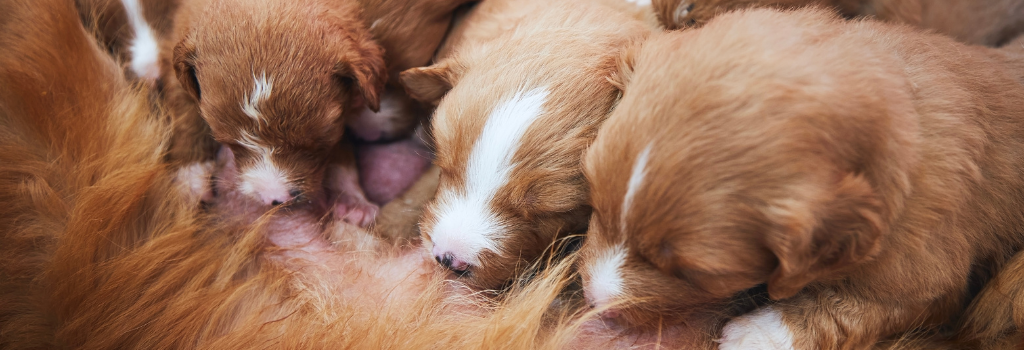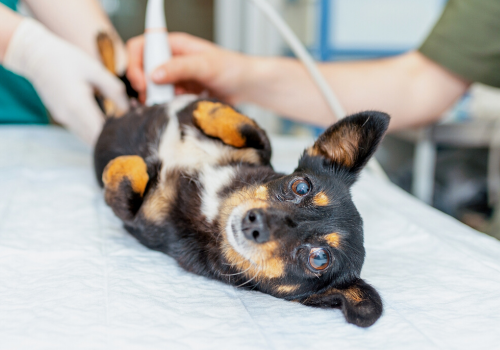If you’ve decided to breed your dog and welcome a litter of puppies into your world, that comes with many questions and concerns about dog reproductive services. From the appropriate age range to assessing fertility, the process includes several steps to ensure successful breeding and your dog’s health. If you’re curious about the first steps to take in breeding your dog, you likely turned to Google for information. At Port City Animal Hospital, we work extremely hard to bring you the accurate information you need. To avoid the misinformation that can sometimes be found online by well-intentioned dog owners, we’ve taken the most frequently asked questions about dog reproductive services and answered them as thoroughly and accurately as possible to ensure you have the facts.
If you’re looking for a highly trained veterinarian in Savannah, GA, we’d love to see your dog for proper screening before breeding, so please call us at (912) 525-0255.
What are the most important factors to consider regarding canine reproduction?
When it comes to canine reproduction, there's a big picture and then several steps along the way that you need to consider thoroughly.
Essential factors in dog reproduction include:
- Ensuring your dog is a healthy candidate, as well as the other dog involved
- The breeds and temperaments of the dogs involved to ensure a healthy gene pool
- A complete understanding of the time and financial commitment
- Potential health issues during the process
- The puppies that will ultimately be your responsibility

Will my dog need breeding screening, and do I go to my vet for that?
Your dog can get breeding scanning from a veterinarian. That typically entails a thorough physical exam of your dog to ensure they’re healthy and don't have anything wrong with them that would make breeding a bad idea or that needs to be taken care of first. Your veterinarian can also do testing to help determine how fertile they are and assess any genetic issues that you need to be aware of before breeding.
The Orthopedic Foundation for Animals (OFA) has a sub-website called the Canine Information Health Center. They list each health screening by breed that is recommended. Even dogs that are combination breeds, such as Goldendoodles and Labradoodles, have recommended health screenings. Some of those screenings need to be done by a veterinarian or specialist. A cardiologist needs to check the heart, an ophthalmologist needs to check the eyes, and a veterinarian needs to take x-rays of the hips, elbows, shoulders, hocks, and possibly more. Some DNA tests can be done without a veterinarian, which involves cheek swabs submitted directly to a testing lab.
How is my dog's pregnancy status evaluated?
After approximately 30 days, your dog will have her first ultrasound to see if there's any sign of pregnancy. Blood tests can also be performed to measure certain hormones and assess if a placenta is formed. After approximately 45 days, we start to see some bone development. An x-ray will give you an idea of pregnancy status at this point, which is quite far along since a dog's pregnancy is only about 63 days total.
Do veterinarians offer dog infertility consultations?
Some veterinarians offer dog infertility services — estimated to be around 100 in the country actively engaged in canine reproductive services known as theriogenology. Not all veterinary clinics are interested in working with breeders, but some are highly skilled in this area.
What is involved when assessing my dog's fertility?
Males are easier to assess for fertility, requiring only a semen collection. Your veterinarian will look at motility, which is the swimming action of the sperm. They’ll also look at the morphology, or shape, sperm count, volume in the ejaculate, and how long the semen lives once it's put into an extender.
Females are harder to assess, and you don't really know until breeding is done if she has good fertility or not. Some of it is based on health and nutrition, as well as age. Dogs over the age of six tend to have a reduction in fertility, so you want to make sure that you’re breeding a young dog that is healthy and on an appropriate nutrition diet — which is generally not a grain-free or raw meat diet.

Do veterinarians offer dog progesterone testing?
Many veterinarians offer progesterone testing, and some labs will do progesterone testing as well. At Port City Animal Hospital, we do progesterone testing in-house, but many veterinarians aren't comfortable with interpreting the results, so they may offer the test but refer you to someone who does theriogenology to interpret the results and make a decision on breeding timing.
What is whelping assistance for dogs?
There are a couple of kinds of interventions for whelping, which is the process of a dog giving birth to puppies. Most people whelp their dogs at home and don't need much veterinary assistance. If needed, veterinarians offer scheduled C-sections and emergency C-sections, as do most clinics offering canine reproductive services. There's also a telemedicine service called Whelp Wise, which is a uterine contraction monitoring service. You rent equipment and put a uterine contraction monitor on your dog twice daily. It assesses the quality of the uterine contractions, the length, and timing. If whelping assistance is needed, injections of calcium or oxytocin can be administered based on what they see on the uterine contraction monitoring. If things aren't going well, you can always decide to change from a whelping at home to a whelping with veterinary assistance, which generally means a C-section.
Can dogs have cesarean sections?
Yes, we do a lot of cesarean sections at Port City Animal Hospital. There are some breeds of dogs that are predisposed to dystocia, which is difficult whelping.
Dog breeds that have difficulty whelping are short-faced dogs such as:
- Pugs
- Bulldogs
- French bulldogs
- Shih Tzus
- Pembroke and Cardigan Welsh corgis
- Greater Swiss mountain dogs
- Bernese mountain dogs
For those breeds, instead of waiting until you’re in trouble or potentially losing puppies, your veterinarian should schedule a C-section. Suppose progesterone testing is done in advance, and your veterinarian can very specifically assess which day the female ovulated. In that case, you can schedule a C-section during regular hours without needing an emergency clinic.
Are there any risks associated with me trying to breed my dog?
Pregnancy is not risk-free. Fortunately, risks in pregnancy are small and infrequent, but there is always the possibility of a complication during pregnancy, labor, a C-section, or after delivery. Although pregnancy is relatively low risk, it is never entirely risk-free. We see the occasional dog with an unfortunate outcome, so you want to think hard about how important whelping and breeding are to you before you decide to breed your female.
What is the reproductive age range for a dog?
We generally recommend waiting until a female dog is at least two years old for their first breeding, primarily because that allows us to complete their reproductive testing first. Some people will breed younger, but you never want to breed on the first heat cycle. On the other end of the spectrum, you should not breed a female beyond the age of eight, as after that age, dogs tend to have a 33% decrease in fertility. Much like humans, older female and older male dogs have a decline in fertility as they age. Once a female is past the age of eight, we don't recommend breeding them. Males can continue to be bred as long as they can produce sperm, which could be well into their teens.
How will I know if my dog needs help breeding?
You generally know if your dog needs help breeding if you haven't achieved a mating or a tie. If that's the case, we can time breeding with progesterone. You would visit your veterinarian’s office for a progesterone test and have results back in less than an hour. At that point, timing can be determined, and you can go ahead with collecting semen and doing one of the three different kinds of insemination.
Dog inseminations can include:
- Vaginal insemination
- Transcervical insemination
- Surgical insemination
What is the procedure for surgical insemination?
Surgical insemination is what it sounds like — a surgical procedure. An incision is made similar to a spay under general anesthesia. Your veterinarian will do blood work, an EKG, IV fluids, and possibly more in advance. They’ll anesthetize the female, exteriorize her uterus far enough to adequately see where they want to put the semen, place a catheter or a needle into the uterus, and inject the semen. The female is then closed up with sutures and sent home the same afternoon.
The alternative is transcervical insemination, done with a rigid endoscope, and the female is awake. There is no anesthesia and no surgical incision. By using a scope instead of surgical insemination, you can still deliver semen frozen, fresh, and fresh-chilled directly into the uterus without anesthesia and the stress of a surgical procedure.
Are there any breeds of dogs that are predisposed to needing reproductive services?
There are breeds of dogs that need reproductive assistance, such as the short-faced brachycephalics mentioned above. Other dogs may encounter an age issue, or possibly a hip issue or other health concern. It's not universally brachycephalic breeds that need help. Corgis also don't have great success with natural breedings and frequently need intervention with some kind of insemination.
Is there a sperm bank for dogs?
There are many sperm banks for dogs, and some are even franchises. There are also veterinary clinics that have independent semen banks and receive semen from all over the world.
Can I inseminate my dog at home?
You can inseminate your dog at home if you choose to do vaginal insemination and use fresh semen. Anything more sophisticated requires veterinarian assistance. The AKC has determined that clients can do their own vaginal inseminations and still register the litter as an assisted semen breeding. Frozen semen should never be injected any way other than with transcervical or surgical insemination because the success rate is only about 11% as opposed to 80% when put directly into the uterus.
If you have further questions about dog reproductive services, reach out to your veterinarian. If you live in or near Savannah, GA, we’d love to see your dog to ensure they’re a viable candidate for breeding, so please don’t hesitate to call us at (912) 525-0255 or email us at [email protected].
